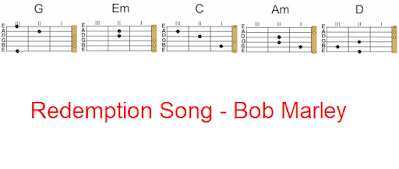What is the main strumming pattern for Redemption Song by Bob Marley easy and simple?
Strum Pattern: down, down up, up down up.
 |
| The Basic Strumming pattern is D DU UDU |
In this guitar lesson were going to learn a Bob Marley classic, Redemption Song.
Chords: Am | Am6 | C | D | Em | G/B | G
If you need the lyrics and chords of this song you can see:
Redemption Song CHORDS and LYRICS by Bob Marley
Chords: Am | Am6 | C | D | Em | G/B | G
Guitar Chords Redemption Song Bob Marley
If you need the lyrics and chords of this song you can see:
Redemption Song CHORDS and LYRICS by Bob Marley
Guitar lesson (easier)
 |
| Redemption Song - Bob Marley (Easy Chords) |
Chords:
- G Major
- E Minor
- C Major
- A Minor
- D Major
Basic Strumming Pattern:
For these types of songs, a common strumming pattern is a down-up pattern. Given the tempo and the chord changes, a typical strumming pattern might look like this:
Down (D) - Down-Up (D-U) - Up (U) - Down-Up (D-U)
Breakdown for Each Chord:
G Major:
- Start by playing a down strum on the G chord.
- Follow it with a down-up strum.
- Then an up strum.
- Finish with a down-up strum.
E Minor:
- Same strumming pattern: D - D-U - U - D-U
C Major:
- Strum C Major with the same pattern: D - D-U - U - D-U
A Minor:
- Strum A Minor with the same pattern: D - D-U - U - D-U
D Major:
- Strum D Major with the same pattern: D - D-U - U - D-U
Applying to the Riff and Walk Down:
For the specific riff and walk-down sections mentioned:
- The initial riff focuses on single notes and partial chords, which might be plucked or strummed lightly, focusing on the root notes and the transitions between them.
- The walk-down from C to A Minor involves transitioning smoothly between these chords, maintaining the rhythm.
Song Structure:
- Intro/Opening Riff: Based on G major, incorporating single notes.
- Verse: G, E Minor, C, A Minor, with the strumming pattern applied to each chord.
- Chorus/Bridge: Might involve repeating the same chord progression with slight variations in the strumming or adding emphasis on certain beats.
Practice Tips:
- Slow it Down: Start by practicing the strumming pattern slowly to get a feel for the rhythm.
- Focus on Transitions: Pay attention to the transitions between chords, especially during the walk-down from C to A Minor.
- Listen to the Song: If possible, listen to the song to get a sense of the rhythm and feel, matching your strumming to the song’s tempo and dynamics.
- Use a Metronome: Practice with a metronome to keep a steady tempo.
By combining the strumming pattern with the chord changes described in the transcription, you can develop a feel for the song and play along with the lesson effectively.
No comments:
Post a Comment